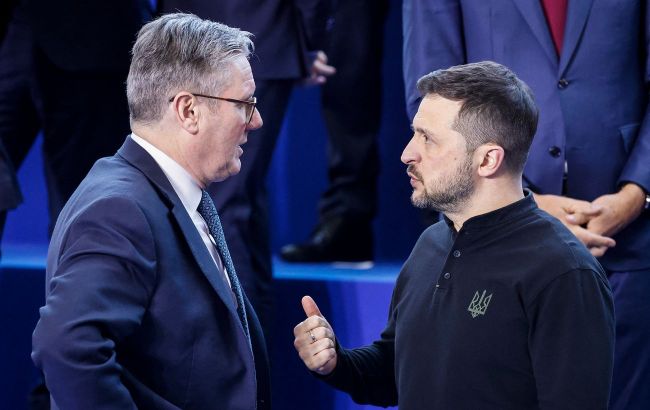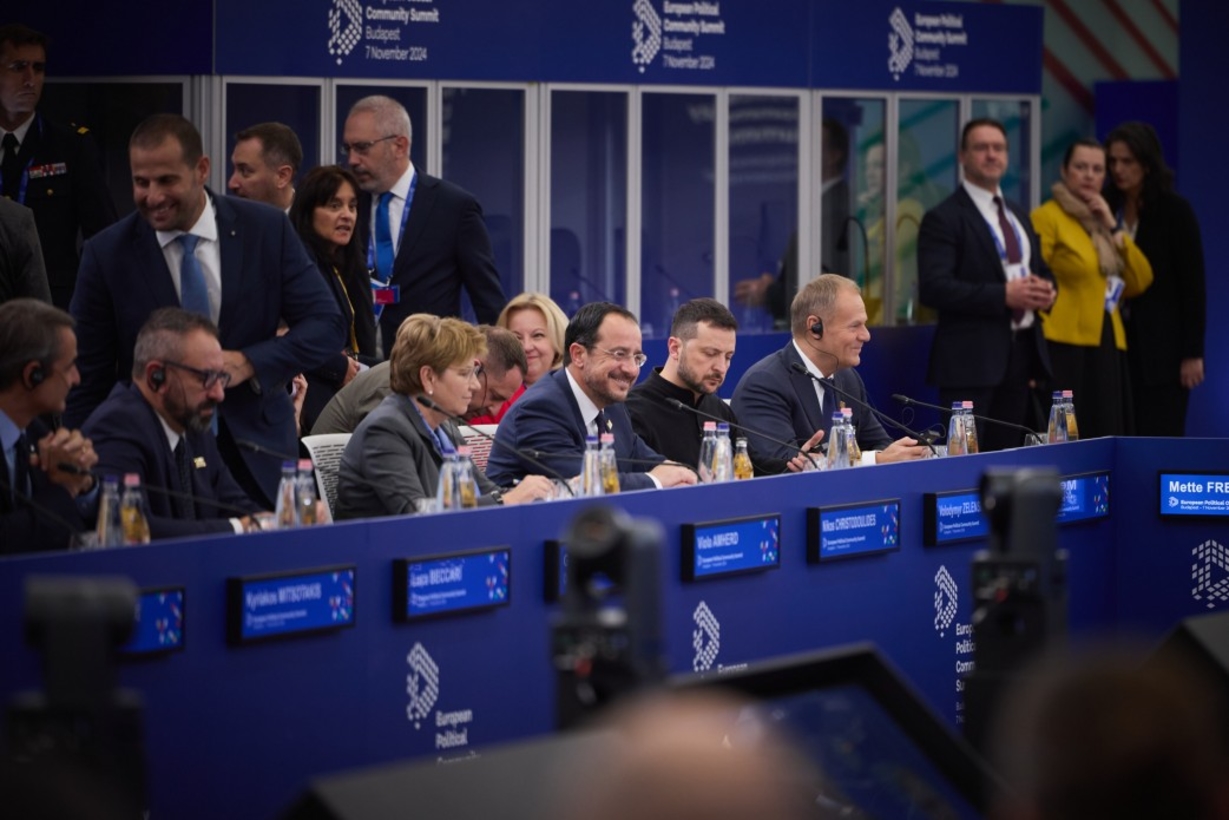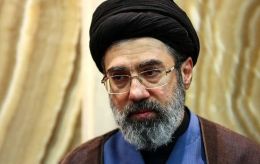Visiting Orbán: Zelenskyy and European leaders discuss Trump’s election victory
 Volodymyr Zelenskyy talks to British Prime Minister Keir Starmer at the summit in Budapest (photo: Getty Images)
Volodymyr Zelenskyy talks to British Prime Minister Keir Starmer at the summit in Budapest (photo: Getty Images)
European leaders have gathered at a summit in Hungary. This is the first such meeting since the election of Donald Trump as President of the United States, which will have very serious consequences for Europe.
RBC-Ukraine reports on the agenda of the meeting, the significance of the summit, and what Ukrainian President Volodymyr Zelenskyy discussed there.
Contents:
- The purpose of the summit in Budapest
- Agenda for Europe
- What Zelenskyy and other leaders discussed at the summit
In Budapest, almost all European leaders have arrived. Hungarian Prime Minister Viktor Orbán is hosting two major events simultaneously. On November 7, the European Political Community summit took place, and on Friday, November 8, EU leaders will hold a separate informal meeting. Ukrainian President Volodymyr Zelenskyy also arrived in the Hungarian capital. This is the first opportunity to discuss the potential consequences and challenges after the US elections before a wide audience.
The purpose of the summit in Budapest
The European Political Community was established in 2022 after Russia's full-scale invasion of Ukraine. It brings together nearly all European countries, including Türkiye, as well as countries from the Caucasus and the Western Balkans. Russia and its close ally Belarus are not invited.
"This format, invented by Macron three years ago, which unites EU members and non-members, is a great opportunity to demonstrate not only viewpoints but also the depth of conviction and readiness to fight for them," said Ambassador Extraordinary and Plenipotentiary Andrii Veselovskyi to RBC-Ukraine’s YouTube channel.
Not all European leaders managed to remain neutral regarding the US election candidates. Some, like Viktor Orbán, made a bid for Trump and hit the jackpot. Before the election, he visited the American politician and discussed the prospects of ending the war between Russia and Ukraine. Whether Trump will need such a mediator remains an open question. However, Orbán's influence in the EU has increased as he is one of the few who maintained contact with the US President during Trump's first term.
On the other hand, the UK’s Labour Party and its leader, Keir Starmer, openly supported Trump's opponent. Moreover, the Labour Party sent over a hundred party members to the US to campaign for the Democrats. This now presents a serious challenge for UK leadership - how to maintain relations with the US under the new conditions.
In some countries, Trump's victory exacerbates long-standing internal contradictions. Germany was the first, and likely not the last, to experience this. On the evening of November 6, the ruling coalition collapsed, and the country found itself on the brink of a political crisis.
However, most EU leaders are already trying to establish relations with Trump's team, sending him congratulatory messages. Some have even already had telephone conversations with him. Yet, this still doesn't guarantee smooth relations with the newly elected US President. It will become clear later how well they will succeed.
"Trump is building his communication with European leaders in a very interesting way, mainly unilaterally, and how the 'chemistry' between each EU leader and Trump will work out will influence the outcome," said Victoria Vdovychenko, co-director of the Future of Ukraine program at the Cambridge University Geopolitics Center, to RBC-Ukraine.
According to Vdovychenko, in this context, the role of a communicator with the US might also fall to Italian Prime Minister Giorgia Meloni. On one hand, she shares similar views with Trump. On the other hand, unlike Orbán, she represents one of the most powerful EU countries and is not in political isolation.
Agenda for Europe
During his election campaign, Trump emphasized two key messages regarding Europe.
The first concerns the economy and is not limited to the European Union but also includes China. During his first presidential term, Trump strongly opposed the influx of foreign exports into the US. He argued that cheaper European and Chinese goods made US businesses uncompetitive, leading to factory closures and job losses for Americans. Trump's plans include imposing import tariffs, which could severely impact the European economy.
On the other hand, Trump has previously expressed intentions to drastically lower energy prices. This idea was presented as part of pressure tactics against Russia. He believes that "Putin could not fight when oil was $40 a barrel."

Meeting of the European Political Community Summit (photo: Office of the President of Ukraine)
A reduction in energy prices would, in the context of the EU, mean a certain improvement, as the European economy has prospered for many years due to cheap gas and oil from Russia. However, when Russian aggression led to a halt in supply, Europe had to urgently replace it with more expensive alternatives.
"This is something Trump can easily and simply do, blackmailing his opponents or countries where US strategic interests intersect. It could also influence geopolitical players such as Russia and Saudi Arabia," noted Vdovychenko.
Trump's second message focuses on European NATO members needing to spend more on their own defense. Compared to his first term, there has indeed been progress in this area, mainly due to the realization of Russia's threat to Europe and the need to help Ukraine.
According to NATO, in 2024, over 20 member countries will allocate more than 2% of their GDP to defense, with 5 countries spending more than 3%. Leading countries in defense spending include Poland, Estonia, the US, Latvia, and Greece. Southern European countries and Belgium are generally behind in defense spending. Therefore, at least in this sphere, EU leaders find common ground with Trump.
However, the current position of Trump on these issues, and the limits of his compromises, remain unknown. Ahead of the Budapest summit, Euronews reported that Orbán might organize a video conference with European leaders and Trump. Such a conversation could have clarified many issues, but it ultimately did not take place.
What Zelenskyy and other leaders discussed at the summit
European leaders agreed to urge Trump to avoid trade wars, support Ukraine, and refrain from disrupting the global order, according to Reuters.
European Commission President Ursula von der Leyen stated that the EU must remain united. Regarding the Russian invasion of Ukraine, she emphasized the importance of sending a clear message to the autocrats of this world that the rule of law is what matters, not the law of strength.
Luxembourg’s Prime Minister Xavier Bettel highlighted that values are crucial for Europe.
Frieden said that Trump is known for his unpredictability, instability, so a dialogue is needed. He added that his country will seek a dialogue, but will not abandon its principles.
Ukrainian President Volodymyr Zelenskyy arrived in Budapest at the invitation of Hungarian Prime Minister Viktor Orbán and European Council President Charles Michel. His agenda included meetings with Ukraine’s key allies, including UK Prime Minister Keir Starmer, French President Emmanuel Macron, and NATO Secretary General Mark Rutte. These meetings typically focus on aligning strategies regarding support for Ukraine.
This time, however, President Zelenskyy also had the opportunity to gather feedback from a wide circle of partners on his victory plan. The plan was presented in October, and since then, it has been internally discussed in each country.
Additionally, President Zelenskyy is one of the few who has spoken with Trump by phone. At the summit, he shared his impressions of the conversation.
"Yesterday, I spoke with President Trump, as many of you did. It was a productive conversation, a good conversation. Of course, we cannot yet know what his actions will be. But we do hope that America will become stronger," he said.
Another aspect of Zelenskyy's visit relates to bilateral relations between Ukraine and Hungary. As RBC-Ukraine reported, a cautious rapprochement between Kyiv and Budapest has been taking shape. Zelenskyy's visit to Hungary, the first since the start of Russia's full-scale invasion, could have marked another step in this process.
However, during the summit, Orbán showed his true stance on Ukraine. Zelenskyy's speech was cut from the official broadcast, suggesting that the Hungarian Prime Minister feels in a strong position and is likely to continue causing problems for both Ukraine and Europe.
At the post-summit press conference, Zelenskyy paid back in his own coin, sharply criticizing Orbán's calls for a "ceasefire" without proper security guarantees for Ukraine, specifically NATO membership.
"Currently, there is no Hungary's support for Ukraine in NATO in the document (the draft bilateral agreement between Ukraine and Hungary - ed.). That is why, the document has not been signed. Full stop," Zelenskyy emphasized.
He was also asked several times about how Trump's presidency and his promises to end the war in 24 hours would affect Ukraine's prospects in the war. Zelenskyy said that he believes Trump really wants a quick end to the war, but that does not mean it will happen.
As a reminder, Donald Trump, the Republican Party candidate, won the majority of votes in the US presidential election. His formal election will take place on January 5, 2025, when the Electoral College votes, but many world leaders have already congratulated him on his victory.
Sources: materials by Euronews, Politico.eu, and comments by Ambassador Extraordinary and Plenipotentiary of Ukraine Andrii Veselovsky and co-director of the Future of Ukraine program at the Cambridge University Geopolitics Center Victoria Vdovychenko.



